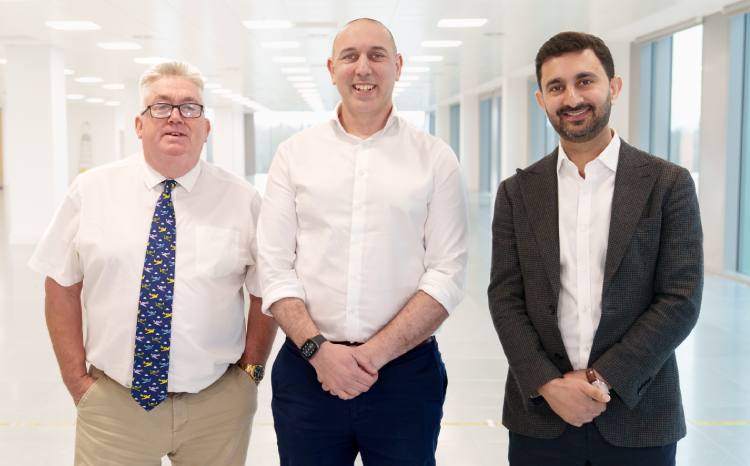Enter the CCG: tackles spaghetti systems
- 9 November 2015

My core computing skills were acquired in the 1980s, during the personal computer revolution. For me, that period was marked by some interesting events and interactions.
First came Alan (now Lord) Sugar, boss of Amstrad, who produced some remarkably budget-priced computers. In part, he managed that through removing anything extraneous (popular sentiment at the time had it that he prowled around his factory at night with a pair of tin snips, cutting off inessential bits of hardware).
Next was Steve Furber, whom I’d known personally at Cambridge. Steve (now a professor of computer engineering, an FRS and a CBE) went on to be part of the team which created the BBC-B microcomputer.
He later designed the first commercial single-chip RISC or reduced instruction set chip for Acorn Computers. The idea in RISC is only to implement the commoner instructions and make them fast, leaving the compiler (or assembly programmer) to construct more complex instructions out of the simpler ones. Overall, such a computer runs much more quickly.
The final member of the trio is someone you won’t have heard of – or rather, you will have, but won’t realise it. Doug Tate, a brilliant, quietly spoken man, began life as an engineer, during which he invented a simple way of replacing a complex piece of kit with something much simpler and cheaper.
Being uncomplicated, it was also more reliable and easier to produce, and eventually became known in the industry as ‘the Tate Gate’.
Doug then moved to teaching music, and become world harmonica champion (as you do). You’ll have heard him without realising, because he was one of three soloists used for the sound-track of ‘Last of the Summer Wine’; he then designed a new, spectacularly powerful harmonica — and also switched to teaching computing.
It was Doug who showed me how to program well, simply by getting me to think about it in the right way. He taught me top-down, procedural programming on the BBC-B (another link to Steve Furber).
Very importantly he trained me to avoid spaghetti programming, which is where people use unstructured code to fix problems — a lazy way to solve programming glitches, and one that can later become a nightmare to debug.
Simplicity is key
Following Doug’s mentorship, I went on to create my first medical IT offering: a complete repeat prescription program utilising only 32K (yes, Kilobytes) of memory, thus proving I really had absorbed his teaching!
Eventually we co-wrote a book on the BBC-B, not just about programming, but the wider use of computers in business, including ergonomics. Doug also did the layout and design, enthusiastically making the paragraphs fit the pages, either by padding out the text, or alternatively removing a word or two.
After a couple of weeks he turned to me and said ruefully: “John, I always know when I’m working on text you’ve already edited because I can’t alter it: if I take a word away it changes the meaning; and if I add a word it looks superfluous.” (I can’t think of higher praise about the writing and editing process, and as a writer I’ve lived on that single sentence ever since.)
OK, so I’m the least important of the four of us by a very long chalk, but nevertheless all of us – Alan Sugar, Steve Furber, Doug Tate and myself – share a single principle: the importance of simplicity and economy. Or as Einstein so pithily said: “Everything must be made as simple as possible. But not simpler.”
Enter the CCG, stage right
This all came to mind during the recent grand meeting of clinical commissioning group members. Like many CCGs, ours is in the red – pretty catastrophically. (And before anybody says anything, I am neither on the executive nor the board, so it’s Not My Fault.)
I do, however, have a sneaking suspicion that my clinical IT colleagues and I may have something to contribute when it comes to getting us out of the mess. And – surprise, surprise – it goes back to keeping things simple.
In the meeting (as so often happens nowadays) we GPs were treated to yet another exhortation to be economical in our prescribing and referring. Then there followed a discussion about creating and approving new systems within the CCG to help us all be more cost-effective in the immediate future.
Umm…… So often the knee-jerk response from NHS bodies to financial problems is to stick extra bits of administrative rigmarole on top of what’s already been done, to try to regulate things better — referral management centres, controls on referrals for procedures of limited benefit, policies to reduce inappropriate attendance at casualty (extend your list here).
Unfortunately, these extra processes can act like an awkward sticking plaster – and then a plaster on top of the first plaster, and another plaster on top of that: in IT terms, spaghetti programming.
The way ahead?
I made two comments from the floor during the meeting.
The first was that the way to deal with the financial crisis wasn’t to add extra layers of protection, but to make things simpler so they are easier to control and easier to operate. Already, we have too few clinicians trying to do far too much work — there’s no point in adding to the complexity of their day.
The second was to ask what a ‘man from Mars’ would say about the CCG and the NHS? Would we really set up the systems we currently have if we were starting from scratch? (Nope.) Therefore, we should work towards creating and using a completely different methodology, concentrating on carrying out everything as slickly and as simply as possible.
When faced with an overspend, most people go into panic mode, trying desperately to think of ‘things we could do’. It may be much more effective to do the opposite – consider ‘things we could undo’. It’s the opposite of spaghetti programming.
At organisational level, ‘keeping it simple’ saves time, money and stress – in short, everything we’re aiming for.
Gratifyingly, it’s started already: into my in-box this morning popped a plan to use a SystmOne template to automate (and therefore simplify and shorten) the collection of data required when applying for procedures of limited benefit. The revolution has begun!

 |
Dr John LockleyDr John Lockley is clinical lead for informatics at Bedfordshire Clinical Commissioning Group and a part-time GP. |
 |




